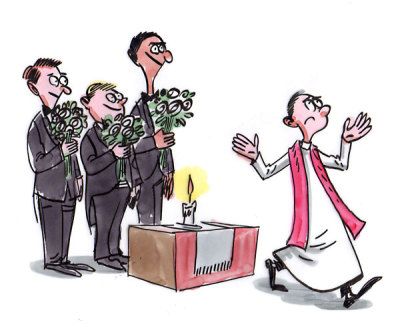10 Myths About Redefining Marriage

Advocates of redefining "marriage" to include same-sex couples use a number of arguments that can best be described as "myths." The reality is often quite different. For example:
MYTH: A "one man and one woman" definition imposes a religious definition of marriage on civil society.
REALITY: The definition of marriage is rooted in nature itself. The sexual union of a man and a woman is what reproduces the human race. The durable commitment of that man and woman to one another is what provides children with a mother and father. This is important for people of any religion or of no religion.
MYTH: Children don't actually need both a mother and a father.
REALITY: An overwhelming body of social science evidence demonstrates that children raised by their own mother and father, who are committed to one another in a lifelong marriage, are happier, healthier, and more prosperous than children raised in any other household setting.
MYTH: Marriage can't be about procreation, because infertile couples are allowed to marry.
REALITY: Laws are based on the rule, not the exception. While not all heterosexual couples do reproduce, it is indisputable that only heterosexual couples can do so naturally. No homosexual couples can do so. That fact provides a clear bright line for limiting marriage to opposite-sex couples.
MYTH: Legalizing homosexual "marriage" would have no effect on other marriages and families.
REALITY: "The law is a teacher," and if we change the definition of marriage we will change what we teach about all marriages and families. For example:
- We would teach—wrongly—that procreation is no longer a uniquely important public interest.
- We would teach—wrongly—that children do not need a mother and a father.
- We would teach that adult desires, not the interests of society or the needs of children, should drive the definition of marriage.
MYTH: Defining marriage as the union of one man and one woman is "discrimination."
REALITY: Every individual has the same access to marriage, but no one has been permitted to marry a child, a close blood relative, a person who is already married, or (through most of human history) a person of the same sex. Removing the last restriction would cast doubt on all the others.
MYTH: Homosexual relationships are the same as heterosexual ones.
REALITY: Research shows that homosexuals are less likely to enter into long-term partnerships, be sexually faithful, or have relationships last a lifetime. Legal recognition of same-sex unions in Scandinavia has led to a weakening of society's commitment to marriage across the board.
MYTH: Homosexuals suffer serious harm because they're denied the "protections" of marriage.
REALITY: Many of these "protections" are already available to same-sex couples through the use of private contractual arrangements, such as wills, durable power of attorney, health care proxies, and life insurance policies.
MYTH: Homosexuals are unable to care for their own children if they cannot "marry."
REALITY: A biological parent has the same rights whether the individual is heterosexual or homosexual. States, if they choose to, can provide for homosexual couples to adopt children without changing the definition of marriage. However, recent research shows that children of homosexual parents suffer significant disadvantages. It is not in children's interest for society to actively affirm a family structure that may harm them.
MYTH: Laws "banning same-sex marriage" are the same as the old laws that banned interracial marriage.
REALITY: It is actually the supporters of homosexual "marriage" who resemble the opponents of interracial marriage. Both groups sought to exploit the marriage laws in pursuit of a social goal irrelevant to marriage. Neither racial segregation (in the one case) nor the social affirmation of homosexual conduct (in the other) was or is related to the basic public purpose of marriage, which is promoting responsible procreation and the rearing of children in the optimal family setting.
MYTH: Legalizing homosexual "marriage" would not affect anyone's religious liberty or conscience rights.
REALITY:
- All taxpayers, consumers, and businesses would be forced to provide financial subsidies for homosexual relationships, whether they want to or not.
- Schools would teach children that homosexual relationships are an option fully equivalent to heterosexual ones, even in opposition to parental teaching.
- Faith-based organizations and individuals would be forced to compromise their beliefs, or be punished or driven from the public square.
As the Supreme Court prepares to hear arguments on whether the U.S. Constitution includes a "right" to marry someone of the same sex, they—and the public—should be wary of falling for these myths.



























